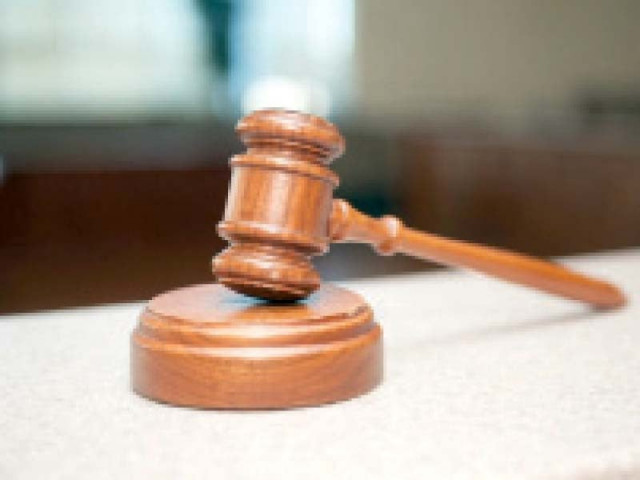2024: Judiciary's turmoil and executive grip
A year marked by clashes, compromises, and constitutional upheaval

The outgoing year (2024) will be remembered for the executive's dominance over the superior judiciary.
Recently, senior puisne judge Justice Syed Mansoor Ali Shah sounded the alarm over what he described as one of the weakest phases in the judiciary's history, warning of heightened risks of executive overreach.
Since March 2009, the superior judiciary has been considered one of the most powerful institutions in the country.
The judiciary was dominant on the parliament and executive and it played a pivotal role in the shaping of national politics.
Even the security establishment avoided confronting the superior judiciary following the reinstatement of judges deposed by Gen Pervez Musharraf in March 2009.
However, rather than strengthening the civilian institutions, the judiciary became a tool to weaken parliament and civilian governments.
The clash among Supreme Court judges began after the Panama Papers leaks judgment, becoming a key factor in weakening the judiciary as an institution.
After the presidential reference against ex-chief justice of Pakistan Qazi Faez Isa, the top court was divided into two camps. One section of judges was supported by the Pakistan Tehreek-e-Insaf (PTI) and the security establishment led by ex-army chief general Qamar Javed Bajwa. The other camp was backing ex-CJP Isa in his difficult times. Major political parties namely Pakistan Muslim League Nawaz (PMLN) and Pakistan People's Party (PPP) were supporting those judges during the PTI regime.
Even after Qazi Faez Isa took oath as CJP in October, 2023, the clash within SC continued on same ideological grounds. Two judges namely Ijazul Ahsan and Sayyad Mazahar Ali Akbar Naqvi were forced to tender their resignations.
The apex court led by ex CJP Isa had compelled other state institutions to hold general elections on February 8.
However, the results show that the ballot was not held in a transparent manner.
Imran Khan's PTI accused ex-CJP Isa and Election Commission of Pakistan (ECP) of rigging the February 8 election. No level playing field was provided to the PTI. The party claimed that results were changed through Form 45. Even Rawalpindi Commissioner had publicly alleged that election was rigged.
Former CJP Isa had acted as guarantor of the present regime throughout the outgoing year. Being head of the institution, he remained quiet on the manipulation of judicial proceedings in ex-prime minister Imran Khan's cases. His bias towards the PTI was obvious during the hearings.
After the February 8 election, Islamabad High Court (IHC) judges raised their voice on the interference of agencies in judicial functions. Six IHC judges wrote a letter to the Supreme Judicial Council (SJC) seeking guidance on the sensitive issue.
However, the leadership of superior judiciary failed to give appropriate response to the powerful circles on the IHC judges' letter. Instead of supporting the IHC judges' stance, ex-CJP Isa considered their letter as a conspiracy against him.
Even suo motu proceedings were initiated on the judges' letter but no deterrence was created.
Later, a majority of SC judges passed a resounding judgment, declaring that PTI was entitled to get reserved seats. That verdict annoyed powerful circles. Even one section of judges in SC was upset on the majority decision as they considered it as an attempt to halt the government move to pass a constitutional amendment for curtailing the powers of the superior judiciary.
After the July 12 order in the reserved seats case, former CJP Isa appeared increasingly reactionary. He played a key role in facilitating the present government in passing the constitutional amendment. Firstly, ex CJP Isa set aside Lahore High Court decisions and allowed recounting in three constituencies of National Assembly (NA) by restoring the Election Commission of Pakistan (ECP) orders. Subsequently, PMLN was able to secure three seats on account of vote recount.
Likewise, he reconstituted a committee working under the Supreme Court Practice and Procedure Act 2023 frrm his 'like-minded' bench for revisiting the judgement which held that vote of defecting lawmakers would not be counted under Article 63A of the Constitution. Reports suggest efforts were made within the SC to prevent Justice Syed Mansoor Ali Shah from becoming the next CJP.
On the other hand, Justice Shah did not give certain guarantees at appropriate time for the continuity of system which was being provided during ex CJP Isa's era. That's why he was superseded by a junior nominee.
PPP Chairman Bilawal Bhutto Zardari himself admitted that the 26th constitutional amendment was not possible in the absence of ex-CJP Isa.
Justice Isa also nominated LHC Chief Justice Malik Shahzad Ahmad Khan for his elevation to the SC at a critical time. Justice Malik Shahzad was taking steps to halt interference of the executive in trial courts' proceedings.
Later, the bench led by Justice Isa had also set aside LHC judgement wherein ECP was directed to notify the election tribunals which was nominated by LHC CJ. Now some retired judges have been notified as election tribunals in Punjab. This could not have been possible without support of ex CJP Isa.
After the passage of the 26th constitutional amendment in October, the executive role has increased in the appointment of judges as well as formation of benches.
The executive has advantage in the new Judicial Commission of Pakistan (JCP) which appoints judges and forms constitutional benches.
The government has managed to establish a 'like-minded' constitutional bench in both the Supreme Court and the Sindh High Court. Senior SC judges appear powerless against the executive's dominant influence over the judiciary, raising concerns about its independence in the public eye.



















COMMENTS
Comments are moderated and generally will be posted if they are on-topic and not abusive.
For more information, please see our Comments FAQ